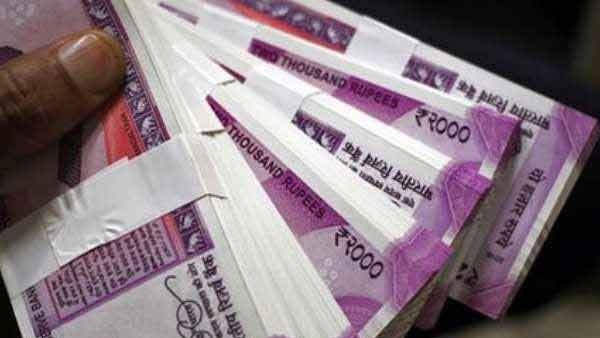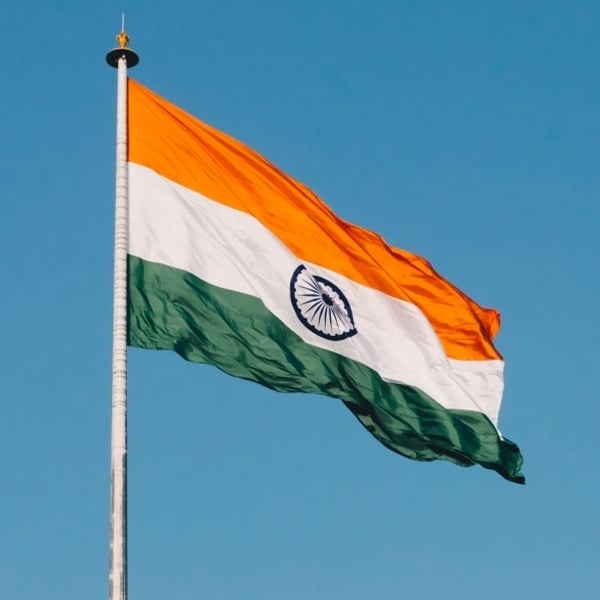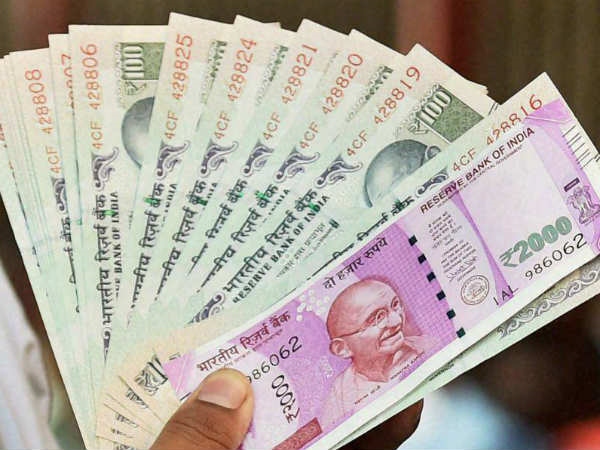Pushpa Telugu Movie Review, Rating
పుష్ప తెలుగు సినిమా రివ్యూ ,రేటింగ్
-
Maha Kumbh 2025 - Amid All Chaos 2 Crore People Take Dip Of Faith
-
Centre monitoring Chinese language mega dam plan, Centre tells Rajya Sabha
-
Synthetic diamonds worth Rs 5 crore seized at Mumbai airport!
-
Will BJP play with Nitish Kumar? NDA's old ally warns
-
Maharashtra minister Nitesh Rane's big statement
-
Congress gave the command of the post of president to this leader
-
When Sanjay Raut raised questions on Shinde getting the award?
-
Cyber cell strict in the case of black marketing of Coldplay concert tickets
-
Eknath Shinde's new political move under 'Operation Tiger'?
-
Big relief to AAP MLA Amanatullah Khan from Okhla
-
Budget proposal of Rs 17000 crore presented in MCD!
-
Police detained students protesting at Jamia University
-
Atishi's big allegation, BJP became a disaster for Delhi...?
-
Female smuggler arrested with 100 grams of heroin in Delhi
-
'Stop worrying about government formation...', BJP's retort
-
Amanatullah Khan's troubles increased further?
-
Delhi Police's traffic advisory regarding Shab-e-Barat!
-
Will this scheme of PM Modi be implemented in Delhi?
-
BJP's review meeting after the results of Delhi Assembly elections!
-
Demand for ban on 'India's Got Latent', CTI wrote a letter!
-
AAP MLA Amanatullah said, 'What does the police do with me...'?
-
AAP MP Sanjay Singh got angry over the Waqf Board Amendment Bill
-
Massive fire in Moradabad plastic factory, breathing difficult
-
Muslims performed the last rites of an elderly Hindu!
-
Those celebrating Valentine's Day should be careful!
-
On Magh Purnima, flood of devotees seen in Varanasi!
-
Suspended Inspector left Hinduism, said- people with demoniac tendencies
-
Don't Paint Your House In This Colour As It Is Considered As The Most Inauspicious
-
This accurate survey about BSP is surprising!
-
Tourists from more than 50 countries arrived in Maha Kumbh!
-
Real life ruined due to reel, wife was made to fire in air
-
Bajrang Dal's announcement on Valentine's Day!
-
Mahant Satyendra Das-last rites across Ayodhya
-
Rakul Preet Ravishes In A Striking Black Minidress With An Unique Halter Neckline
-
This Woman Stays with PM Modi Like a Shadow - Do You Know Who She Is?
-
Donald Trump Initiates Peace Talk To End Ukraine War - 'No More Lives Should Be Lost'
-
Star Hero Demands Director To Keep LIP LOCK Scene With Pooja Hegde
-
Ram Charan Unfollows Allu Arjun - All Is Not Well In Mega Family
-
Meet Tulsi Gabbard - The First Hindu To Lead US Intelligence In Trump's Cabinet
-
Pooja Hegde And Her 'FLOP' Reality
-
Prime Video Device Limit Anger Users Even More
-
Telangana - Man Pours Petrol on Woman, Threatens To Set Her on Fire After She Rejected Him
-
Pooja Hegde's Print-on-Print Outfit Gets a Casual Twist
-
Organized Foreign Séx Racket Exposed After VIP Road Accident
-
Taliban's BIG demand to India - Asks Modi Govt to Handover Control of...
-
Pooja Hegde And all the Hustle in Her Grey Three-Piece Suit
-
Bengaluru SHOCKER - SSLC Student Jumps From 20th Floor As Mother Asked Her To Study
-
Ram Charan unfollowed Allu Arjun..!? Is it true..?
-
Modi's stay in a 119-room building in America..!?
-
Trump creates panic before meeting Modi..!?
-
New FASTag rules are to come into effect from February 17..!?
-
Nikhil Advani does not want to work with Shahrukh-Salman
-
Anupam Kher will be seen with Prabhas in the next film
-
Vijay's Kingdom got so many views in 24 hours!!
-
Arab countries united after US aid was stopped
-
Ibrahim and Khushi seen in an auto leaving their car worth crores?
-
John Abraham reached Shillong with his wife at Ed Shireen's concert
-
Vicky Kaushal reached Prayagraj Mahakumbh before the release of 'Chhava'
-
Manchu Mohan Babu gets relief from Supreme Court
-
Harshvardhan expressed his views on Bollywood?!
-
Harrison's dream was to be a part of Marvel
-
Aamir Salman's film will be re-released on the big screen on this day
-
These stars have raised the flag of their acting in Pakistan
-
Munawar Faruqui came out in support of Samay Raina
-
How was the box office collection of Vijay Deverakonda's last five films?
-
Celebrities often find themselves caught in fans' fights!??
-
TRP This Week: Rupali Ganguly's show 'Anupama' on top
-
Who will become the new boss of Delhi?
-
Finance Minister Nirmala Sitharaman introduced the new Income Tax Bill
-
Will Trump's tariffs affect India..!?
-
Waqf Bill JPC Report: Fierce conflict in Parliament
-
An explosion in a government ministry in Kabul??!
-
Kobali Team Celebrates Success, Confirms Major Twists in Part 2..!?
-
Thandel Target Finish..!! Chaitu's Biggest Bounce Back..!?
-
Has China violated the Modi government's ban..?
-
Rashmika Mandanna Flaunts Silk Suit Worth Rs 1,09,900
-
Actress's strange habit..? Do not repeat clothes..!?
-
Rashmika Mandanna's Rs 28,500 yellow silk chanderi kurta set is just perfect
-
Rashmika Looks Ravishing In Zardozi Jacket Set Worth Rs 3.6 lakh
-
Samantha Enjoys Auto Ride While Enjoying Rakul Preet's Song
-
Forest Movies - The Latest Trend In Tollywood
-
New OTT Series - Routine Thriller Or Something Intense?
-
Can Rajini survive in cinema without slow-motion scenes?
-
China's clarification on the Wuhan lab test..!?
-
Teaser Ready For Rashmika Mandanna's Next Blockbuster?
-
It's Ajith Vs Vijay Vs Dhanush At Summer Box-Office
-
Corporate Bookings - Will Govt Step Up Atleast Now?
-
Intriguing Suspense Thriller - February's Dark Horse?
-
Ram Charan Making The Same Mistake As Prabhas
-
Wake Up Prime Video - Hire New Social Media Team
-
OTT's New Obsession - Noticed This?
-
Star Hero Faces Flops - PR Won't Help, Only Good Movies Can...
-
4 Most Promising OTT Shows This Month
-
Chhaava - Are The Huge Bookings Real or Rigged?
-
Japanese Company gives Hangover leave for Employees..!?
-
Koratala Siva Really Did Fail Jr NTR !?!
-
PM Modi's 36-hour US visit..!! Key issue meeting..!?
-
Will Vishwak Sen's Risk Pay Off This Time?
-
Blockbuster Success - More Love Tragedy On The Way?
-
Thandel May Not Touch $1 Million At USA Box-Office
-
February's Biggest Hope - Will It Deliver Tomorrow?
-
This is the secret of Prime Minister Modi's food..!?
-
Thandel HD Leak - Box-Office Impact?
-
IND vs ENG: England captain suffers humiliating defeat..!!?
-
Did Gambhir take revenge on Rishabh Pant?
-
Simbu and Nayan's pranks during the film shooting..!?
-
Nokia, Qualcomm bag 5G wireless wireless get entry to devices deal from Airtel
-
Instagram pronounces teenager bills with parental controls built-in India: What does it imply for customers?
-
DeepSeek gives China's chipmakers a leg up in the race for inexpensive AI
-
Here's why some internet users are advocating for a boycott of Coca-Cola.
-
BMC To eating places: Switch To electric 'Tandoors' Or Face License Cancellation
-
Naga Chaitanya recently gave statement on Samantha's cryptic post!
-
Sandhya Bindani danced so well on Pawan Singh's song!
-
Siddharth Tewatia on vulgarity controversy, police sent summons
-
Got an award from PM Modi, now embroiled in controversy!
-
Bhavna's father did not like Chunky Pandey?
-
Deepika Padukone attended Pariksha Pe Charcha 2025!
-
India's Got Latent Controversy: Another setback for Ranveer Allahabadia!
-
Shahid Kapoor did an arranged marriage with Mira!
-
Chiranjeevi is afraid of losing the legacy?
-
Mrunal Thakur became a fan of Kangana's Emergency!
-
Mukesh Khanna furious over Ranveer Allahbadia's obscene statement!
-
'Chhaava' will become the biggest opener of the year 2025!
-
'Baddass Ravikumar' flopped, forget about recovering the cost!
-
Ranveer Allahbadia Vulgar Remark: Samay Raina out of country!
-
Despite working in 20 films, he had to sell his wife's jewellery!
-
This actress in support of Samay Raina, said- kissed on the lips!
-
'Have some mercy...' Jaya Bachchan urged the government!
-
Khushi-Junaid's 'Loveyapa' is in bad shape at the box office!
-
Why did Tejasswi Prakash join the cooking-based reality show?
-
CM's name not announced in Delhi yet, AAP accuses
-
AAP MLA Amanatullah wrote a letter to the Police Commissioner...
-
Big decisions will be taken in the first cabinet meeting of BJP!
-
Raghav Chadha cornered the Modi government over railways...
-
Congress leader Sandeep Dixit's shocking statement...
-
AAP leader Saurabh Bhardwaj launched YouTube channel?
-
Ashok Gehlot's big statement after Delhi results...
-
Delhi Metro fare increased by 50 percent after BJP's victory?
-
Politics on the name on Ravidas Jayanti in UP!
-
Setback for Gayatri Prajapati, who was a minister in the Akhilesh government
-
Amidst the growing uproar, UPCL took a big decision
-
Shivpal's son Aditya got angry on BJP MLC's VIP protocol...
-
Bullies riding a Scorpio car beat up a person riding another car
-
Mayawati expels Ashok Siddharth, makes this allegation!
-
Ghanan Bhai passes away, CM Dhami also expressed grief
-
SP MP Jaya Bachchan lost her temper in Rajya Sabha
-
UPSTF's founding member IPS Ajay Sharma passed away
-
An elderly couple in Kanpur is forced to wander from door to door
-
Shankaracharya of Shringeri Math reached Gorakhnath temple!
-
How much salary did Ramlala's chief priest Satyendra Das get?
-
Relief news for more than 10000 homebuyers of Jaypee Infratech!
-
Sharp rise in gold loan defaults of banks, NPA increased by 21 percent!
-
Trump's tariff attack and foreign investors selling
-
Mukesh Ambani reached Maha Kumbh with family!
-
Anil Ambani's company will be sold, new owner is ready!
-
Nirmala Sitharaman said these big things in Parliament!
-
Fear of trade war created chaos in the stock market!
-
Baba Ramdev's company Patanjali made huge profit!
-
Action on Adani is wrong! 6 US lawmakers raised questions
-
PM Modi can directly talk to Donald Trump on these issues!
-
Meet Racheal Kaur, Indian woman who flies 350 km daily for work
-
Why do Street Dogs Chase Vehicles at Night? It's Not What You Think
-
These 4 Medicines Will Save You From Any Emergency Condition - Must Have In Home
-
In This Indian Town, Girl Must Get Pregnant Before Marriage
-
Trisha Social Media Gets Hacked By Cryptocurrency Scammers
-
M,L To FML: Why Indian Manufacturers Simply Can't Get Sizing Proper
-
Easy Styling Tips To Add A Hint Of Luxury To Your Own Home
-
How The Brain Overcomes Worry:
-
Transform Your Property's Outdoor Area With These 5 Decor And Layout Hacks.
-
Being Attentive To Your Gut Feelings:
-
Miracle Repair For Hair Fall Or Just A Hair Care Hype?
-
Scandinavian Design Secrets And Techniques That Make Homes Feel Like A Warm Hug
-
'Winter Arc' Is The Ultimate Cold-Climate Skincare Trend.
-
Right Here's How To Properly Do The 5-Minute Skin Care Glow
-
Ditch The Carbs, Keep The Nutrition
-
Instagram Introduces Teen Accounts With Parental Controls In India
-
Instagram Introduces Teen Accounts With...
-
Does this spell trouble for Pooja Hegde's Career?
-
If you are afraid of stroke, then avoid normal salt & include this salt
-
Man Crushed Under Barbell, Lean Girl Struggles To Help - GYM Horror
-
Secrets For Luscious Hair Growth Like Pooja Hegde
-
India's Common Man Gets Relief As Inflation Likely To Dip to a 5-month Low of 4.60%
-
Jasprit Bumrah ruled out of Champions Trophy 2025 - Who Replaces Him?
-
Pooja Hegde Makes A Comeback To Kollywood
-
Emmanuel Macron Ignores PM Modi - SHAME
-
Listeria Outbreak? Don't Eat Bakery Items
-
Pooja Hegde Expressed Her Deep Connection To...
-
World's Most Corrupt Country List Released - The Top Rank Goes To...
-
Andhra Plans WFH For Women - CBN's Big Bet
-
First Woman Cricketer To Be Banned By ICC For Corruption
-
Not Green, You Should Eat Black Grapes Daily To Experience This Magic
-
This Long Suspense Thriller Flick Doesn't Have Any Hero - Made on 8 Crores, Earned 100 Crores, Climax Will Stun You
Empowering 140+ Indians within and abroad with entertainment, infotainment, credible, independent, issue based journalism oriented latest updates on politics, movies.
India Herald Group of Publishers P LIMITED is MediaTech division of prestigious Kotii Group of Technological Ventures R&D P LIMITED, Which is core purposed to be empowering 760+ crore people across 230+ countries of this wonderful world.
India Herald Group of Publishers P LIMITED is New Generation Online Media Group, which brings wealthy knowledge of information from PRINT media and Candid yet Fluid presentation from electronic media together into digital media space for our users.
With the help of dedicated journalists team of about 450+ years experience; India Herald Group of Publishers Private LIMITED is the first and only true digital online publishing media groups to have such a dedicated team. Dream of empowering over 1300 million Indians across the world to stay connected with their mother land [from Web, Phone, Tablet and other Smart devices] multiplies India Herald Group of Publishers Private LIMITED team energy to bring the best into all our media initiatives such as https://www.indiaherald.com

 But after the coming of british rule, monthly salaries were given to all departments and industries. In addition to this, only 48 weeks of salary will be paid if the various holidays are taken into account in the year. This was a great opportunity for the british to save money. Tried to implement this as such. But protests broke out across the country. That means 52 weeks means 13 months of salary, while 48 weeks means only 12 months of salary. Common workers were losing their salaries for a month.
But after the coming of british rule, monthly salaries were given to all departments and industries. In addition to this, only 48 weeks of salary will be paid if the various holidays are taken into account in the year. This was a great opportunity for the british to save money. Tried to implement this as such. But protests broke out across the country. That means 52 weeks means 13 months of salary, while 48 weeks means only 12 months of salary. Common workers were losing their salaries for a month. From 1930-1940, protests took place in various parts of the country, starting in Maharashtra. After various stages of consultation, the law was enacted in june 1940 to provide 12 months' salary every month and 13th months' salary on Diwali. It later became diwali Bonus. Many in independent india cheated the employees by not following the old rules and not giving them this 13 months salary i.e. bonus amount. To correct this, the indian government has put all the companies under regulatory action, forcing employers to pay a certain percentage of their profits to employees as bonuses.
From 1930-1940, protests took place in various parts of the country, starting in Maharashtra. After various stages of consultation, the law was enacted in june 1940 to provide 12 months' salary every month and 13th months' salary on Diwali. It later became diwali Bonus. Many in independent india cheated the employees by not following the old rules and not giving them this 13 months salary i.e. bonus amount. To correct this, the indian government has put all the companies under regulatory action, forcing employers to pay a certain percentage of their profits to employees as bonuses. This regulatory action is known as the Payment of Bonus Act, of 1965. According to this act, the company has to pay a bonus to its employees at a minimum rate of 8.33% and a maximum rate of 20%.
This regulatory action is known as the Payment of Bonus Act, of 1965. According to this act, the company has to pay a bonus to its employees at a minimum rate of 8.33% and a maximum rate of 20%.



 click and follow Indiaherald WhatsApp channel
click and follow Indiaherald WhatsApp channel